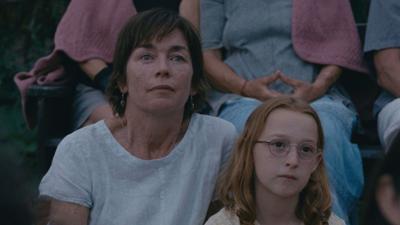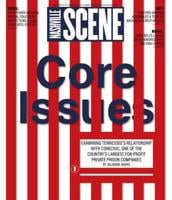Janet Planet is slow like summer should be — resting in the golden light of sunset at a cabin, with bugs and birds droning, a fan whirring in the corner. But before we can get to this idyll, the story opens with a clear manipulation, one that feels like it’s probably taken place many times before. From a pay phone at sleepaway camp, 11-year-old Lacy (Zoe Ziegler) calls her mother Janet (Julianne Nicholson in one of her finest performances) and threatens to kill herself if she’s not picked up. Upon leaving, Lacy is surprised to discover that some of the girls at camp are sorry to see her go — but Janet explains she’s already gotten back some of her deposit.
Janet and Lacy spend the summer of 1991 together at home in Western Massachusetts, with three other adults in their atmosphere. First is Janet’s boyfriend Wayne (Will Patton), who occupies space in ways that are initially respectful, but become imposing. Then comes Regina, played with great liveliness by Sophie Okonedo, who needs a place to stay after a breakup. By the time theater troupe leader Avi (Elias Koteas) enters for the third act, we are weary of these outsiders and the way Janet shifts her orbit to them.
Janet Planet is the directorial debut from Annie Baker, whose play The Flick won the 2014 Pulitzer Prize for Drama. Heralded for its transfixing slow burn, The Flick was so glacially paced that it reportedly drove some audience members to walk out early. Janet Planet is very slow as well. (In one of the best depictions of girlhood in the film, Lacy and a new friend read The Valley of the Horses by Jean M. Auel in a mall bookstore. Together they sound out the word languorous, which feels like Baker saying, “Here’s the word to describe this movie, if you’re looking for one.”)
Godland cinematographer Maria von Hausswolff’s 16 mm celluloid shots shift between ordered spaciousness and extreme closeness. Everything feels precisely staged, even positions of rest. Scenes of mother and child are particularly subdued, even the late-night discussions that reveal how both characters are using each other as a mirror. (“Every moment of my life is hell,” Lacy says. “I’m actually really unhappy too,” replies Janet.) The outsiders bring the most noise: Wayne’s garbled lawn mower, Regina’s blasting of Laurie Anderson’s “My Eyes,” Avi’s pretentious lectures about God.
As the summer rolls on, surrealism bubbles at the edges of Lacy’s perception, giving the sense that she might have some power. The weakness of Janet Planet is that it’s both too much and not enough — its surrealism is a little too subtle, and its message is a little too obvious. (If you miss the point, there’s a section from Rainer Maria Rilke’s “Fourth Elegy” — read aloud not once but twice — to spell it out for you.)
Lacy’s coming of age is not a revelation. It’s more like a tenuous awareness of what her mother can’t show her about being a woman, in particular the importance of cultivating female community over male attention. And while Nicholson’s performance illustrates this divide beautifully — Janet is open to growth but gravitationally pulled toward old habits — Janet Planet feels a little unsure of how it wants to leave us, an attempt at ambiguity that falters. But perhaps that’s the realest part of Baker’s style of storytelling: that hollow bit of nothing at the end of childhood that sends us right back to where we started, dreaming of summer.





